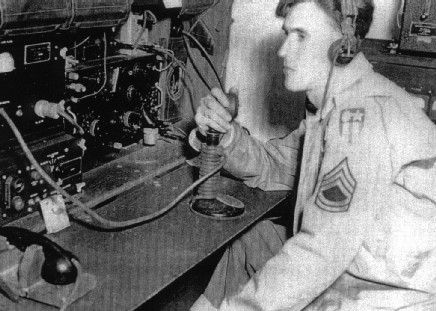|
|
|
![]()
“BLACKPOOL” THE BURMA
INFERNO
“Fred” Recalls Vividly
In April of 1944 I took a complete ground station into the Imphal Valley of India to set up a traffic control center for the airstrip. Four Radio Operators accompanied me. We were attached to the British Forces handling over 5000 flights in and out with contact kept with our home base at Slyhet, Assam, India called “Catfish”.
Upon returning to Sylhet we were met by Captain BERNIK and advised not to unpack as Lieutenant SIEGEL, William F., WRIGHT, “Tom” L. and I were going to “Clydeside” (later named “Blackpool”) to once again set up a ground station. I had heard often of “Clydeside” from the many wounded brought into Imphal. We were not looking forward to the mission.
On Friday night of 13 May 1944 “Bill”, “Tom” and I boarded “Abel Fox” with all the gear to set up the station which was to be called “Smart Guy”. We landed at almost dark receiving a lot of ground fire, including much tracer, on the way in. “Tom” and I set the station up and were on the air by 9:00 P.M.. We talked in a lot of flights that first night as we stayed on the air until morning. The on going battle consisted of 2,000 Japanese attacking 400 British. On Sunday the Japanese 105mm put “Smart Guy” out of order - this was mother’s day. The British had lost 150 men (killed) before rain set in lasting two days. There was a great deal of 105mm fire and much “Zero” staffing. On Sunday night a C-47 tried to land with a cargo of a jeep and other equipment. The aircraft struck a tree, crashed and killed the Pilot and Co-Pilot. (The tree was in the territory held by the Japanese.) The Radio Operator had been sitting in the jeep and received not a scratch. A British Captain, with the help of some Burmese, led him to us. The flight engineer ran the wrong direction and directly into the hands of the Japanese. Needless to say we did not see him again.
Enemy aircraft later
bombed the crashed C-47 making certain it would not fly again.
It was raining on Monday thus no drop missions were made and the British forces had no ammunition. “Bill” approached “Tom” and me, handing us a small bag, stating “here guys is the only ammo left use it wisely.” Later that night a few flights got in to remove wounded. “Bill” was able to get “Tom” on a C-47 of the 315TH Troop Carrier Squadron, also stationed at Sylhet, India. A British pilot who had brought a “Dakota” in with no other crew except himself, came to me and inquired if I was familiar with the aircraft. Acknowledging that I was he quickly stated, “O.K. - ride the right seat with me.” I climbed aboard - on the floor were six litters of badly wounded and eighteen more in bucket seats We taxied to the end of the strip getting the tail as far back into the jungle as possible. With full brakes, we revved her up to full power, let her jump, as only a C-47 could do, and with 1/4 flaps got her into the air. Our departure was directly over the Japanese forces and we received much tracer fire. The pilot was a “Buck Pilot” yet Captain of this flight of an aircraft with flame dampers over the exhaust pipes and landing lights covered over.
At this point I would like to recall an event of March of the same year. I was called out of the sack by the “Officer of the Day” who stated that the tower was in contact with a lost aircraft. They wanted me to report to the radio maintenance shack to shoot a bearing on the plane. The aircraft had less than ten minutes of fuel left as it changed course towards our base. Its engines sputtered to a stop as the wheels hit the runway. The young man flying that aircraft was the same Sergeant Pilot who took me out of “Clydeside”. God does work in mysterious ways.
The Japanese snipped the only water hole we had and our supply was near nil.
The aircraft had to land and take off in the same direction as there was a large mountain at the one end of the strip. It was risky flying and required the utmost of concentration and skill on the part of the pilots.
Clydeside fell to the Japanese with great heavy losses to the British - a huge setback to their war effort .They were all very brave men fighting under the worst of conditions.
At this writing I do not remember how “Bill” got out - but he did safely.

BARKALOW, Frederick S.
12137205
Copied from a report submitted by BARKALOW, Frederick S.
H.A Blair
20th January 1997